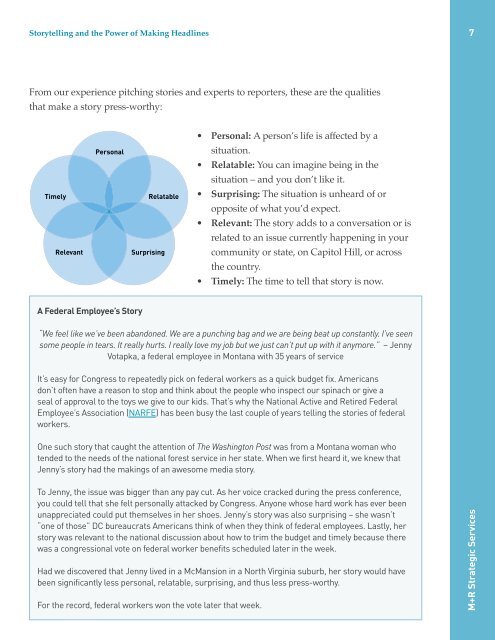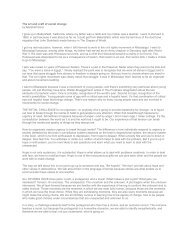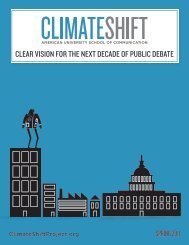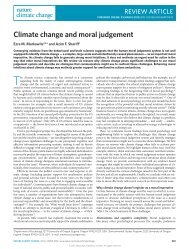Storytelling and the Power of Making Headlines - M+R Research ...
Storytelling and the Power of Making Headlines - M+R Research ...
Storytelling and the Power of Making Headlines - M+R Research ...
You also want an ePaper? Increase the reach of your titles
YUMPU automatically turns print PDFs into web optimized ePapers that Google loves.
<strong>Storytelling</strong> <strong>and</strong> <strong>the</strong> <strong>Power</strong> <strong>of</strong> <strong>Making</strong> <strong>Headlines</strong>7From our experience pitching stories <strong>and</strong> experts to reporters, <strong>the</strong>se are <strong>the</strong> qualitiesthat make a story press-worthy:TimelyRelevantPersonalRelatableSurprising• Personal: A person’s life is affected by asituation.• Relatable: You can imagine being in <strong>the</strong>situation – <strong>and</strong> you don’t like it.• Surprising: The situation is unheard <strong>of</strong> oropposite <strong>of</strong> what you’d expect.• Relevant: The story adds to a conversation or isrelated to an issue currently happening in yourcommunity or state, on Capitol Hill, or across<strong>the</strong> country.• Timely: The time to tell that story is now.A Federal Employee’s Story“We feel like we’ve been ab<strong>and</strong>oned. We are a punching bag <strong>and</strong> we are being beat up constantly. I’ve seensome people in tears. It really hurts. I really love my job but we just can’t put up with it anymore.” – JennyVotapka, a federal employee in Montana with 35 years <strong>of</strong> serviceIt’s easy for Congress to repeatedly pick on federal workers as a quick budget fix. Americansdon’t <strong>of</strong>ten have a reason to stop <strong>and</strong> think about <strong>the</strong> people who inspect our spinach or give aseal <strong>of</strong> approval to <strong>the</strong> toys we give to our kids. That’s why <strong>the</strong> National Active <strong>and</strong> Retired FederalEmployee’s Association (NARFE) has been busy <strong>the</strong> last couple <strong>of</strong> years telling <strong>the</strong> stories <strong>of</strong> federalworkers.One such story that caught <strong>the</strong> attention <strong>of</strong> The Washington Post was from a Montana woman whotended to <strong>the</strong> needs <strong>of</strong> <strong>the</strong> national forest service in her state. When we first heard it, we knew thatJenny’s story had <strong>the</strong> makings <strong>of</strong> an awesome media story.To Jenny, <strong>the</strong> issue was bigger than any pay cut. As her voice cracked during <strong>the</strong> press conference,you could tell that she felt personally attacked by Congress. Anyone whose hard work has ever beenunappreciated could put <strong>the</strong>mselves in her shoes. Jenny’s story was also surprising – she wasn’t“one <strong>of</strong> those” DC bureaucrats Americans think <strong>of</strong> when <strong>the</strong>y think <strong>of</strong> federal employees. Lastly, herstory was relevant to <strong>the</strong> national discussion about how to trim <strong>the</strong> budget <strong>and</strong> timely because <strong>the</strong>rewas a congressional vote on federal worker benefits scheduled later in <strong>the</strong> week.Had we discovered that Jenny lived in a McMansion in a North Virginia suburb, her story would havebeen significantly less personal, relatable, surprising, <strong>and</strong> thus less press-worthy.For <strong>the</strong> record, federal workers won <strong>the</strong> vote later that week.<strong>M+R</strong> Strategic Services











